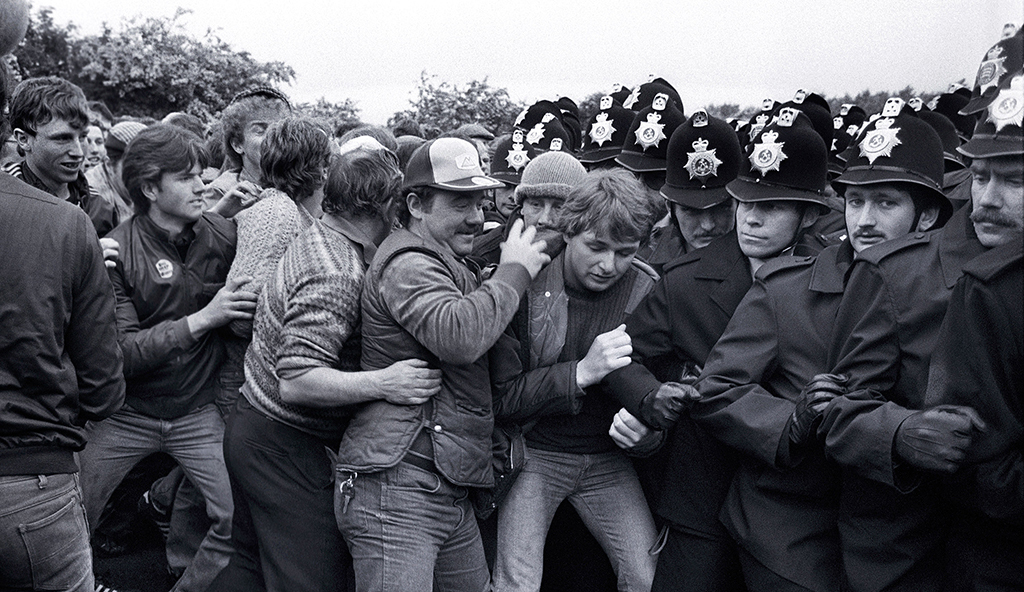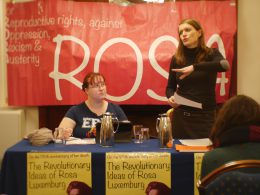By Helen Redwood
A “civil war without guns” aptly describes the struggle against pit closures in Britain 1984-85, which had the potential to bring Margaret Thatcher’s right-wing government toppling down.
This was a watershed event. British capitalism was in long-term decline, and the Tories planned and picked their moment. They hoped to inflict a terminal blow on the trade union movement, which had stood in the way of the bosses’ attempts to claw back hard-won wages and conditions built up during the post-World War Two economic boom that lasted from 1945 until the mid-1970s.
State repression
For an entire year, the battle waged between the working class, using weapons of strikes, solidarity and mass action, and the ruling class, using the full force of the state – the many-headed hydra of new anti-trade union laws, a militarised police force, the army, agent provocateurs, spies, the courts and media. Repression became the order of that time, with some areas in Nottingham, Yorkshire and Scotland turned into virtual police states.
The Tories expected a quick victory given the craven lack of fighting will amongst the right-wing Trade Union Congress (TUC) and Labour leadership. They had not reckoned on the courage and determination of the mining communities to defend their lives and livelihoods, nor on the solidarity they inspired from the working class across Britain and even internationally.
A huge support network mushroomed, connecting pit villages with workplaces, women’s support groups, trade union branches and trades councils, and local Labour Party branches (the party still had important connections with the working class and had an important and sizeable grassroots left-wing opposing its pro-capitalist leadership) and local support groups.
Inspiring solidarity
Women played a vital role in the strike and not just in organising food and welfare. Thousands of women from the pit villages joined picket lines and toured Britain and Ireland to explain the miners’ cause.
Lesbians and Gays Support the Miners (LGSM) was formed to build practical solidarity for a pit village in the Welsh valleys, as depicted in the excellent 2014 film Pride. This was particularly courageous given the high point of the AIDS crisis, which fueled an LGBTphobic moral panic. They showed that the media vitriol and police aggression experienced by the miners was not dissimilar to that meted out to the LGBT community. It was a great example of how prejudice can be challenged through common cause and action.
The Tories would not be allowed to starve the miners back to work. Convoys of trucks could be seen driving food, clothing, children’s toys and desperately needed funds to mining areas. Bucket collections outside supermarkets were to be seen everywhere. Visits were made to local factories and workplaces to set up regular collections and levies. Some Labour Councils set up canteens, provided free school meals and suspended rent payments.
Need for general strike
Important solidarity action was taken by seamen, rail and transport unions who refused to move coal, risking their own jobs. There were many smaller actions such as the walkout at Porth bus depot when management refused hire to the local NUM branch. Two hundred school and tech students in Port Talbot, Wales, joined a picket of the local steelworks in the face of police harassment and orders from their head teacher to return to school.
Illegal solidarity action was already taking place in the face of the anti-trade union laws. The travesty was the refusal of the Labour and TUC leadership to match this fighting spirit and to organise a united campaign of solidarity action leading to general strike action.
The potential for united action was there. Dock workers engaged in a three-week strike over the use of scab labour to move coal at the docks. The very month the miners’ strike broke out, the battle of Labour Councils against local government cuts and privatisation was reaching its height, most notably with the Militant-led (forerunner of the Socialist Party’s sister party) Liverpool City Council. Other sections, such as the rail unions, had pay claims in.
A struggle betrayed
Rank-and-file pressure was needed to circumvent the dead-hand of right-wing leaders. The Militant-led Broad Left Organising Committee organised a conference which brought together 2,200 delegates from 20 union Broad Lefts including 100 miners, but unfortunately this didn’t have sufficient reach to alter the course of the strike.
The militancy of the working class shown during this struggle turned the ‘new realist’ ideas of the Labour and TUC leaders on their head. Such ideas were just feeble excuses to abdicate from leadership. If there is one lesson that shines out from this period it is the need to build strong rank-and-file organisations to democratise the unions and to replace faint-hearted leaders with lions who will match the courage and fighting capacity seen during the miners strike.












